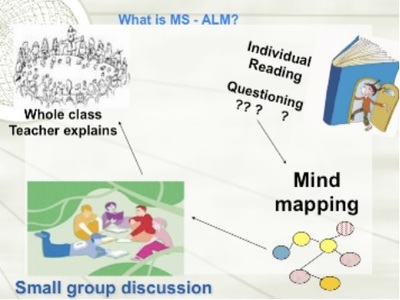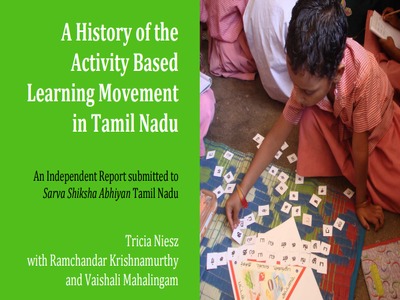Introduction
ABL and ALM methodologies were successfully implemented while he was Commissioner of Chennai municipal corporation and state project director of SSA (Sarva Shiksha Abhiyan). Some reports produced at that time are given below.
Time-on-Task !
Time-on-Task refers to the amount of time that students and teachers spend actively engaged in learning activities. In primary schools of Tamil Nadu, Time-on-Task is a crucial factor in determining the effectiveness of educational programs.
For students, Time-on-Task means the amount of time they spend engaged in learning activities such as listening to lectures, participating in group discussions, working on projects, and completing assignments. To maximize student learning and engagement, it’s important for students to spend a significant portion of their time in class actively involved in these types of activities.
For teachers, Time-on-Task means the amount of time they spend preparing for and delivering lessons, providing feedback and guidance to students, and evaluating student progress. Effective teachers in Tamil Nadu’s primary schools carefully plan their lessons and activities to ensure that they are using their time effectively to engage students and facilitate learning.
Organizational Culture Study
Organizational culture study refers to the examination and analysis of the values, beliefs, behaviors, and attitudes that make up the unique character of an organization. This field of study focuses on understanding how organizational culture impacts the experiences of employees, influences the organization’s success and its ability to adapt to change, and shapes the ways in which people interact and communicate within the organization. The goal of organizational culture study is to identify and understand the factors that contribute to a strong, positive, and effective organizational culture, and to develop strategies to improve it.
ABL (Tamil Nadu)
Activity Based Learning (ABL) in Tamil Nadu aims to engage the child actively in learning activities that can be completed at her or his own individual pace. In multi-age/multi-grade classrooms, students work independently and in small groups through carefully-designed learning activities referenced on a learning ‘ladder.’ These materials are predominantly cards that describe activities, although three dimensional mathematics manipulatives are also used. A chalkboard at the child’s level extends around the perimeter of the ABL classroom, providing each child with a work space of her own. Teachers work with individuals and small groups, promoting and assessing children’s learning at their current ‘step’ in the learning ladder. Click for more details >>
ALM (Active Learning Methodology)
Successful implementation of ABL lead to a crop of students graduating from primary to elementary levels.
There was a felt need to revamp the pedagogy for the middle sections in schools to bring about a shift from passive listening to active learning. Active learning involves the participation of all students in the learning process. The classroom process should provide for the scope of imbibing democratic values by way of sharing, respecting other views, concern for others, etc.
The outreach team of the school promoted by ‘Krishnamoorthy Foundation of India(KFI)’, helped the Tamilnadu govt in developing a mixed-age group pedagogy giving scope for practicing and inculcating the values mentioned above for every student. The pedagogy called Active Learning Methodology (ALM) was implemented in 12,500 schools across the state. The manual detailing the process is attached. In the process, students are given the opportunity to learn ‘How to learn? ‘The daily routine involves an introduction by the teacher very briefly then students have to read the text, discuss in groups among their peers, after understanding it thoroughly, they need to summarize, make a presentation, and finally frame questions as well. This process helps them develop a number of skills like self-reading, comprehending, summarizing, presentation, discourse, analysis, etc.
ABL (Chennai Corporation)
Activity Based Learning (ABL), has drawn upon several resources, we have the possibility of a system which can succeed in keeping children motivated and fully occupied, while they are mastering the fundamentals. ABL offers solutions to two major problems: multi-grade classes and inadequate staffing. It provides the learning material for several children to be working on, while the teacher is busy with one group. ABL appears to be a system where the teacher can facilitate learning, without dominating the classroom or intimidating the children. Since the child learns in a selfdirected way, from the systematic materials provided, teacher absence or occasional unavailability may not be a tragedy. Click for more details >>
Cool Breeze
In the state of Tamil Nadu, for Government schools, the winds of change began blowing in 2002.
- The SSA took the Rishi Valley (KFI) Rural Education model in 2003, tested it, modified it to suit the TN schools, and then took the vertical age group structure to all its 37000 primary schools (grades 1 to 5) by 2007 in careful phases.
- The SSA took the Active Learning Methodologies in May 2007, based on the practices at The School (KFI), Chennai, and rapidly implemented it for all state upper primary classes, about 16000 in number, in grades 6,7,8 by early 2008.


Uttara Vahini
School Education and Change School education does not lend itself easily to change. Teacher led initiatives stay local, within a class mostly, extended to school on rare occasions at best. Therefore it is quite remarkable that the work of a small band of teachers from The School in Chennai has touched the lives of over 200,000 teachers and 10 million students. These teachers, as a band, are part of a major thrust to give education a new turn in the State of Tamilnadu. These teachings have had a profound influence on the school. Teachers have experienced an invitation to “be responsible for the whole school”, to be immersed in learning, to take roles and to shed them. Click for more details >>






